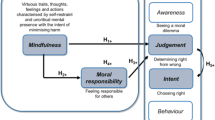Abstract
In A New Form of Agent-Based Virtue Ethics, Daniel Doviak develops a novel agent-based theory of right action that treats the rightness (or deontic status) of an action as a matter of the action’s net intrinsic virtue value (net-IVV)—that is, its balance of virtue over vice. This view is designed to accommodate three basic tenets of commonsense morality: (i) the maxim that “ought” implies “can,” (ii) the idea that a person can do the right thing for the wrong reason, and (iii) the idea that a virtuous person can have “mixed motives.” In this paper, I argue that Doviak’s account makes an important contribution to agent-based virtue ethics, but it needs to be supplemented with a consequentialist account of the efficacy of well-motivated actions—that is, it should be transformed into a mixed (motives-consequences) account, while retaining its net-IVV calculus. This is because I believe that there are right-making properties external to an agent’s psychology which it is important to take into account, especially when an agent’s actions negatively affect other people. To incorporate this intuition, I add to Doviak’s net-IVV calculus a scale for outcomes. The result is a mixed view which accommodates tenets (ii) and (iii) above, but allows for (i) to fail in certain cases. I argue that, rather than being a defect, this allowance is an asset because our intuitions about ought-implies-can break down in cases where an agent is grossly misguided, and our theory should track these intuitions.
Similar content being viewed by others
Notes
There is room for leeway here, depending on the number of variables involved and the magnitude of the outcome – for example, if a person’s action discovers the cure for cancer, it may merit a 5 or 7 on the CV scale. This will be a matter for reasonable discretion.
This is a view proposed by Harry Frankfurt (1969) in Alternate possibilities and moral responsibility. Journal of philosophy 66: 829–39.
References
Andre J (1983) Nagel, Williams and moral luck. In: Statman D (ed) Moral luck. State University of New York Press, Albany, pp 123–130
Cox D (2006) Agent-based theories of right action. Ethical Theory Moral Pract 9(5):505–515
Doris J (2002) Lack of character. Cambridge University Press, Cambridge
Doviak D (2010) A new form of agent-based virtue ethics. Ethical Theory Moral Pract 1–14. doi:10.1007/s10677-010-9240-0
Driver J (1961) Uneasy virtue. Cambridge University Press Ebooks (CRKN)
Hume D (2003) An enquiry concerning the principles of morals. In: Darwall S (ed) Virtue ethics. Blackwell, MA. (originally published 1751)
May L (2010) Genocide: a normative account. Cambridge University Press, Cambridge
Nagel T (1979) Moral questions. In: Statman D (ed) Moral luck. State University of New York Press, Albany, pp 57–72
Nussbaum M (1986) Luck and ethics. In: Statman D (ed) Moral luck. State University of New York Press, Albany, pp 73–109
Slote M (2001) Morals from motives. Oxford University Press, Oxford
Williams B (1976) Moral luck. Proc Aristotelian Soc 50:115–135
Williams B, Smart JCC (1973) Utilitarianism: for and against. Cambridge University Press, Cambridge
Yuen J. Hero teen saves heart attack victim. Toronto Sun 1 Oct 2010. http://www.torontosun.com/news/torontoandgta/2010/10/01/15551891.html. Accessed 10 March 2010.
Author information
Authors and Affiliations
Corresponding author
Rights and permissions
About this article
Cite this article
Ciurria, M. A New Mixed View of Virtue Ethics, Based on Daniel Doviak’s New Virtue Calculus. Ethic Theory Moral Prac 15, 259–269 (2012). https://doi.org/10.1007/s10677-011-9285-8
Accepted:
Published:
Issue Date:
DOI: https://doi.org/10.1007/s10677-011-9285-8




